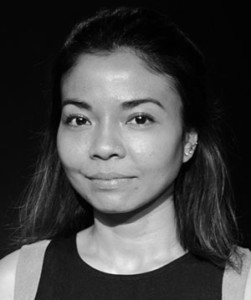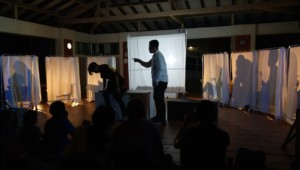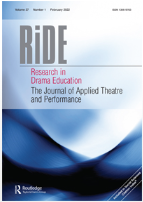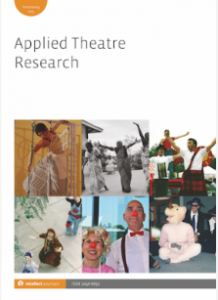Dr Natalie Lazaroo fuses her passion and interest for physical theatre and the performing arts with research in the educative and transformational role of community collaborations in this space. She is passionate about changing the narratives around inclusion and belonging for young people especially those in social housing.
 Her social justice interest brought her to Griffith and GIER, and Natalie also works closely with Brisbane-based community organisations such as Vulcana Circus and Voices of Colour. She has also directed and performed in theatre and circus productions at the Brisbane Powerhouse, Metro Arts, and QPAC.
Her social justice interest brought her to Griffith and GIER, and Natalie also works closely with Brisbane-based community organisations such as Vulcana Circus and Voices of Colour. She has also directed and performed in theatre and circus productions at the Brisbane Powerhouse, Metro Arts, and QPAC.
On this work Natalie says:
“It’s often making visible the invisible. Collaboration is about negotiating with the community on what’s important to them. If, as an academic, I come in with my own ideas, there’s a hierarchical imbalance. Research is also about listening and letting the participants direct the research.”
One of her recent projects involved working closely with Vulcana Circus and survivors of domestic and gender-based violence to empower women through physical theatre. Natalie says:
“We spent a few months teaching the women circus skills (such as juggling or acro) and then devising a show around the theme of “survival.” The show was performed at QPAC in December 2021, which was a creative project, but it is also feeding into a chapter I’m writing for a book titled Performing Homescapes that will come out in the next year or so. It will consider how the notion of ‘home’ can be reframed through community circus work with survivors of domestic violence.”
On this project Natalie says:
“A lot of the work had to do with confidence building and trust. A lot of the women were not sure what the Vulcana performance would entail. They did not want the show to be all about trauma. Ultimately though, it was a celebration of strength, recovery and survival. It also became a place of community and support for the women.”
Natalie has always had a passion and interest in the creative arts and is drawn to research in this area due to the powerful catalyst and potential it provides for community building. She is an integral part of the Brisbane circus community and volunteers time to document, provide reflection and feedback on the works.
She says:
“It was a space for us to work together, and understand the kinds of struggles women go through, in terms of policy, legislation and how certain structures have failed or challenged them. It was a space that was about foregrounding them. It became a community, we are all still in touch with each other, and some have gone onto do more circus since it ended, so it was an important exercise in community building, that was not terminated once the show was done.”
Another component of Natalie’s research work is working with young people in Singapore who live in low socio-economic (SES) neighbourhoods. This has been a long collaboration since 2016, working with social workers who are also drama facilitators, to create performance works that address community issues.

Sayang, presented by The Community Theatre (Singapore). Photo Supplied.
She received a Humanities Travelling Fellowship from the Australian Academy of the Humanities, which supported some of this research. This project sought to understand how participation in theatre and drama helps to build a sense of cultural citizenship among young people from disadvantaged backgrounds.
Natalie says:
“Many of the participants or their families have experienced incarceration and substance abuse. In this project they devise a performance on issues relevant to their lives. It’s an important platform to communicate with the community and find ways to collectively problem solve.”
Coming up, Natalie is part of an exciting new project called “Culture for Climate” which is a collaboration with the Creative Arts Research Institute (CARI) at Griffith. Key people on this project include Tanja Beer, Julian Meyrick and Linda Hassall. The idea is to profile and understand how arts organisations in Australia can lead the way through the climate change crises with their programming, practices, and policies. She will also be involved in a related project called “Climate Scape”, led by Linda Hassall.
Natalie says:
“Dr Linda Hassall’s field is in eco-critical and ecological performance. She initiated this project with Vulcana, to look at how circus artists, scholars, and scientists can collaborate to communicate climate change issues faced by the broader community through circus. We are in initial discussions, but I’ll be involved in this project once it’s underway.”
To read more of Natalie’s fascinating work, see these publications both of which have emerged out of a long-term collaboration with a community organisation in Singapore, working with young people living in social housing.

‘Five stars arising’: a conversation about applied theatre, precarity, and resilience in Singapore

Rekindling the kampong spirit: Fostering a sense of belonging through community theatre in Singapore


